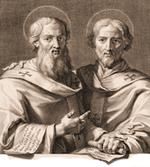Fathers of the Church
Personal Letter LV: Letter to Rufinianus
by Athanasius in After 362 | translated by Payne-Smith
To our lord, son, and most desired fellow-minister Rufinianus. Athanasius greeting in the Lord.
You write what is proper for a beloved son to write to a father: accordingly, I embraced you when you came near me in writing, most desired Rufinianus. And I, though I might write to you as a son both in the opening and the middle and the close, refrained, lest my commendation and testimony should be made known by writing. For you are my letter, as it is written, known and read in the heart. That you then are in such case, believe, yea believe. I address you, and invite you to write. For by doing so you afford me the highest gratification. But since in an honourable and church-like spirit, such as becomes your piety, you ask me about those who were drawn away by necessity but not corrupted by error, and wish me to write what resolution has been come to about them, whether in synods or elsewhere; know, most desired Lord, that to begin with, when violence was ceased, a synod has been held, bishops from foreign parts being present; while others have been held by our fellow-ministers resident in Greece, as well as by those in Spain and Gaul: and the same decision was come to here and everywhere, namely, in the case of those who had fallen and been leaders of impiety, to pardon them upon their repentance, but not to give them the position of clergy: but in the case of men not deliberate in impiety, but drawn away by necessity and violence, that they should not only receive pardon, but should occupy the position of clergy: the more so, in that they offered a plausible defence, and what had happened seemed due to a certain special purpose. For they assured us that they had not gone over to impiety; but lest certain most impious persons should be elected and ruin the Churches they elected rather to acquiesce in the violence and to bear the burden, than to lose the people. But in saying this, they appeared to us to say what was plausible; for they alleged in excuse Aaron the brother of Moses, who in the wilderness acquiesced in the people's transgression; and that he had had as his excuse the danger of the people returning to Egypt and abiding in idolatry. For there was reason in the view, that if they remained in the wilderness they might cease from their impiety: but if they went into Egypt they would become ruined and increase the impiety in their midst. For this reason, then, they have been allowed to rank as clergy, those who had been deceived and suffered violence being pardoned. I give this information to your piety in the confidence that you will both accept what has been resolved upon, and not charge those who assembled, as I have said, with remissness. But be good enough to read it to the clergy and laity under you, that they may be informed, and may not blame you for being thus minded about such persons. For it would not be fitting for me to write, when your piety is able to do so, and to announce our mind with regard to them, and carry out all that remains to be done. Thanks to the Lord that filled you with all utterance and with all knowledge. Let then those that repent openly anathematise by name the error of Eudoxius and Euzoius. For they blasphemed still, and wrote that He was a creature, ringleaders of the Arian heresy. But let them confess the faith confessed by the fathers at Nicaea, and that they put no other synod before that one. Greet the brotherhood with you. That with us greets you in the Lord.
Taken from "The Early Church Fathers and Other Works" originally published by Wm. B. Eerdmans Pub. Co. in English in Edinburgh, Scotland, beginning in 1867. (NPNF II/IV, Schaff and Wace). The digital version is by The Electronic Bible Society, P.O. Box 701356, Dallas, TX 75370, 214-407-WORD.






